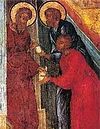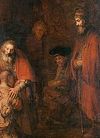

| Previous day | Next day |
| Old Style
January 22
|
Sunday |
New Style
February 4
|
| Sunday of the Prodigal Son. Tone 2. | No fast.
|
![]() Apostle Timothy of the Seventy (ca. 97).
Apostle Timothy of the Seventy (ca. 97). ![]() Monk-martyr Anastasius the Persian (628). St. Macarius, founder of Zhabyn Monastery (Belev) (1623).
Monk-martyr Anastasius the Persian (628). St. Macarius, founder of Zhabyn Monastery (Belev) (1623).
Hieromartyrs Manuel, George, Peter, and Leontius, bishops; Sionius, Gabriel, John, Leontus, and Parodus, priests; and 377 companions, in Bulgaria (ca. 817). Martyr Anastasius, hierodeacon of the Kiev Caves (12th c.).
St. Brithwald, bishop of Ramsbury (1045). St. Joseph Samakus the Sanctified, of Crete (1511).
Thoughts for Each Day of the Year
According to the Daily Church Readings from the Word of God
By St. Theophan the Recluse

Sunday of the Prodigal Son (34th). [I Cor. 6:12–20; Luke 15:11–32]
The week of the prodigal speaks of so much to us! It speaks about our peace and satisfaction in the house of the heavenly Father, about our mad departure from the Father’s guardianship to unbridled freedom, about the richness of the heritage given us despite our disobedience, about its reckless waste on all sorts of indecencies, and about our utter impoverishment as a result. But then it talks also about how one recovers his senses, and, coming to himself, decides to return to his greatly merciful Father. It talks about how he returns, how he is received lovingly, and is restored to his first state. Who will not find this lesson profitable? If you abide in your father’s house, do not strive for freedom. You see how a similar experience ended! If you have run away and are squandering all, end this quickly. If you have already squandered everything and are living in poverty, decide quickly to return—and then, return. There every indulgence, and all the former love and satisfaction, await you. This last step is the most necessary one. But there is no point in enlarging upon this. All has been said concisely and clearly. Come to your senses, decide to return, arise and hurry to the Father. His embrace is open and ready to receive you.
Articles
 Apostle Timothy of the SeventyThe Holy Apostle Timothy was from the Lycaonian city of Lystra in Asia Minor. Saint Timothy was converted to Christ in the year 52 by the holy Apostle Paul. |
 St. Brihtwald of WiltonSaint Brihtwald (Berhtwald) was the last Bishop of Ramsbury, Wiltshire. |










